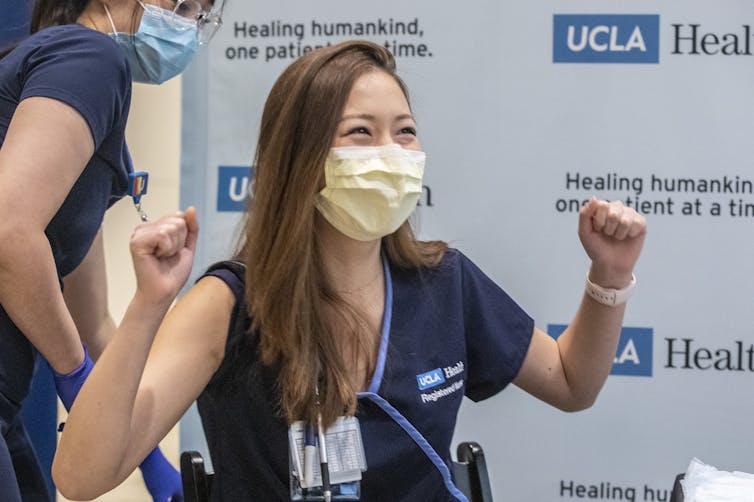Not so fast, says the CDC, but you can gather with other vaccinated people
William Petri, University of Virginia
 |
| Nurse Nicole Chang celebrates after receiving one of the first injections of the COVID-19 vaccine Dec. 16 at UCLA Medical Center in Westwood, California. Brian van der Brug/Getty Images |
More than 30 million people in the U.S. are now fully vaccinated against coronavirus, meaning that a fraction of the population is immune to COVID-19.
This is because vaccination with the Pfizer, Moderna and Johnson & Johnson vaccines offers very high levels of protection against the coronavirus. However, there is still a small risk that vaccinated people could transmit the disease to others.
As an infectious-disease doctor, I’ve been fielding a lot of questions from my patients as well as my friends and family about what someone is allowed to do once vaccinated. Do vaccinated people need to wear masks, socially distance and avoid travel?
If you are fully vaccinated – that is, if you are more than 10 days out from receiving both doses of the Pfizer or Moderna vaccines or one dose of the Johnson & Johnson – you can visit other fully vaccinated people without socially distancing or wearing masks, according to the new CDC guidelines.
You can even visit indoors with unvaccinated people from a single household who are at low risk for severe COVID-19 disease without wearing masks or physical distancing.
The CDC does suggest you be tested if you develop symptoms that could be COVID-19. You should then stay isolated until you are shown to be uninfected. If you are fully vaccinated, you should still avoid social settings that include multiple unvaccinated households.
And, you should avoid medium to large crowds because of the increased risk. You also should continue to wear a well-fitted mask, wash your hands frequently and maintain physical distance when outside the home. Worshipping indoors at a synagogue, mosque or church is still not advisable unless all attending are vaccinated.
Also unchanged are travel recommendations: The CDC recommends avoiding travel even if you are fully vaccinated. The aim of delaying travel is to protect yourself and others from the small risk of acquiring or transmitting COVID-19, since travel on public transportation exposes you to unvaccinated people from multiple households.
So in the face of continued pandemic transmission and new viral variants, we all need to remain vigilant and observe good health practices even after being vaccinated. However, it is very good news that we can prudently lift some of the restrictions that have so limited our ability to be with loved ones.
This is especially good news for seniors who are particularly vulnerable to the downside of isolation.
[Research into coronavirus and other news from science Subscribe to The Conversation’s weekly science newsletter.]![]()
William Petri, Professor of Medicine, University of Virginia
This article is republished from The Conversation under a Creative Commons license. Read the original article.